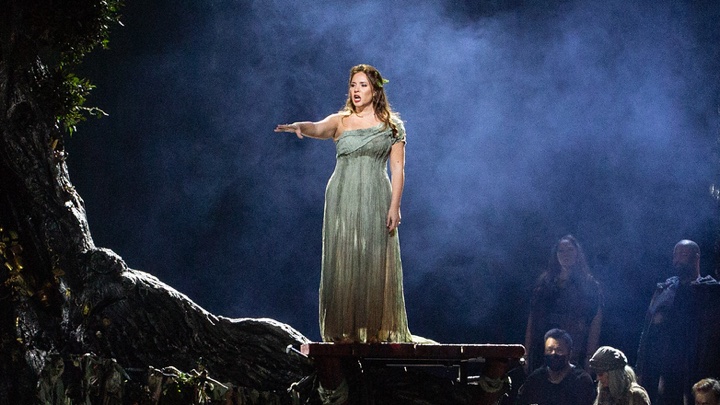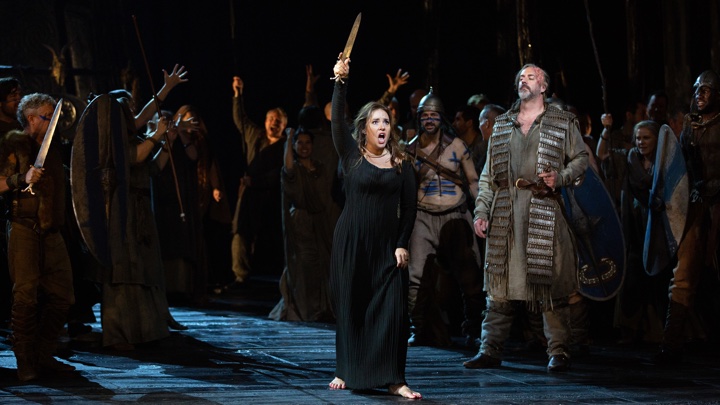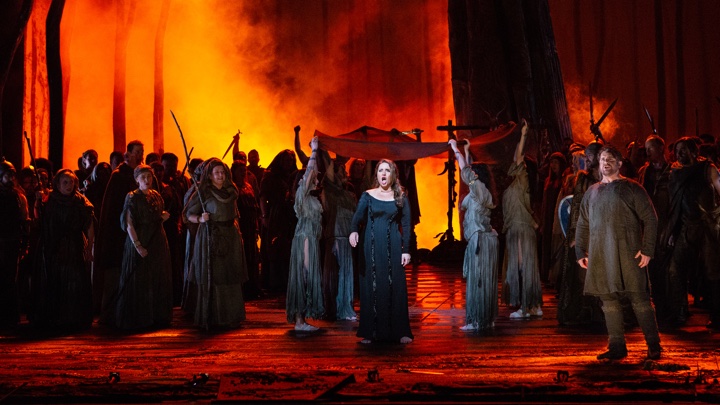
If the superstar soprano non grata hadn’t made a crucial decision a decade ago and reneged on it then soon after, thousands of us might have been spared the sorry spectacle we experienced last night at the Met.
Ok, that was clickbait, and there is plenty of blame to go around. So much so that on the train ride home I was thinking that I don’t want to see or hear Norma ever again.
My reasoning goes that if Netrebko hadn’t agreed to take on Bellini’s iconic Druid priestess, Covent Garden wouldn’t have mounted its new production in 2016, nor would the Met have done the same the next year. But as with Faust’s Marguerite and Le nozze di Figaro’s Countess, Netrebko withdrew, leaving opera houses scrambling for replacements. For London’s Norma, Sonya Yoncheva, then still an ambitious soprano “who can’t say no,” stepped in and had a success.
The Met turned to Sondra Radvanovsky to open its Norma—yet another benighted Sir David McVicar production it probably wouldn’t have commissioned if not for Netrebko. After all, Radvanovsky had had a success several years earlier and the company’s old John Copley staging served her just fine.
After once again stepping up when Kristine Opolais disappeared from the new Met Tosca, Yoncheva has risen to the top, and I try to imagine how this season’s revival of the McVicar Norma came to be. What it the Met’s idea: “We’ve got this big ugly expensive production we should revive and people love Norma, right?” or Yoncheva’s: “I had a success in London and more recently in Madrid and I’m now your faithful reigning assoluta, so of course my New York public wants to hear my Norma.” Either way, three-plus hours of Bellini on Tuesday felt far longer than Sunday’s five of Wagner.
Having seen both Radvanovsky and Angela Meade when the production was new, repressed memories of the worst McVicar “ideas” came rushing back last night: Adalgisa’s off-the-shoulder sackcloth schmatte; Clotilde and the kids hanging out during “Mira, o Norma;” the parade of hunky supers carrying in pyre-planks throughout “Qual cor tradisti” and more.
Before the curtain rose on Robert Jones’s funky trellised forest, Maurizio Benini led a fast and furious overture and I briefly hoped he’d become a welcome bel canto maestro, but soon enough his lugubrious tempi predominated, and his Norma became as limp and attenuated as his Met Semiramide had been.
Christian Van Horn’s tendency to oversing once again surfaced as Oroveso. His is a big healthy, buzzy high-baritone but it didn’t seem a good match for Norma’s dull dad. In the past I’ve never been a big fan of Pollione’s scena, but this time I was sure grateful for it as Michael Spyres’s boldly confident rendition turned out to be the evening’s highlight.
Perhaps the tenor was not in optimal voice, his rangy tenor initially sounding quite baritonal and cloudy in its upper middle range. However, by the duet with Adalgisa he’d found his bearings. Ordinarily one feels that Norma and Adalgisa would be well rid of their Pollione, but in this case it was precisely the opposite.
I wonder who thought casting Ekaterina Gubanova as Adalgisa was a good idea? Her repertoire recently has concentrated on Wagner—she’s an acclaimed Venus and Brangäne—suggesting Bellini’s florid writing might not be her strong suit.
While the Russian mezzo handily stole the show with Neris’s plaintive aria during the season-opening Medea, her thick, matronly voice was all kinds of wrong for Norma’s conflicted vestal virgin. While she gave an expressive and committed portrayal, her Adalgisa just didn’t fit in nor blend well with Yoncheva’s Norma.
Since I first heard her as part of the 2007 edition Jardin des Voix, Les Arts Florissants’s young artist program., I’ve remained a Yoncheva fan as I watched her progress from Purcell’s Dido to Met triumphs as Violetta and Mimi. I’ve admired more controversial portrayals like Tosca and Elisabeth in Don Carlos and enjoyed her solo recital at the Met last year. But all that good will couldn’t persuade me that her Norma was anything but a huge misfire: an endearing lyric trying way too hard to become a dramatic coloratura.
From her opening recitative, she pushed and pushed for volume. Her painfully slow “Casta diva,” full of weird vowels and broken phrasing, threatened more than once to fall apart. Its cabaletta signaled that florid passages would be rushed through without precision or accuracy. Yoncheva’s beleaguered priestess lacked the needed gravitas in public.At home in her lavish private yurt (but why the big hole in the ceiling. just like the Met’s current Traviata?!), the soprano proved a sympathetic mentor to nervous Adalgisa. though their duets tumbled along without much Bellinian finesse. The confrontation with Pollione strained Yoncheva to the breaking point though she made a surprisingly effective stab at the bristling “Oh non tremare” and capped the trio with a loud high D-natural.
Once in a while one could enjoy her enticing smoky, covered sound as she spun a quiet legato line—in “Teneri figli” and “Deh! Non volerli vittime” but as soon as she had to ramp up the volume, she became harsh and hollow. Her frequent use of chest nearly always turned shrewish and raspy.Throughout an increasingly dispiriting performance, my mind wandered. While Yoncheva was screaming like Santuzza at Spyres during “In mia man,” I thought of Antonia in Les Contes d’Hoffmann compulsively singing despite knowing she shouldn’t.
By Norma’s conclusion, I had felt little stake in the Druid priestess’s fate: I was instead wondering if Yoncheva would ever sing again: so much did this folly sound like it was costing her. But she’s scheduled to be back in Gaul Saturday evening and five more times after that.Yoncheva is absent from the Met roster next season; my hope is that she’ll return in roles more congenial and never go near Norma again.
Photos: Marty Sohl / Met Opera






